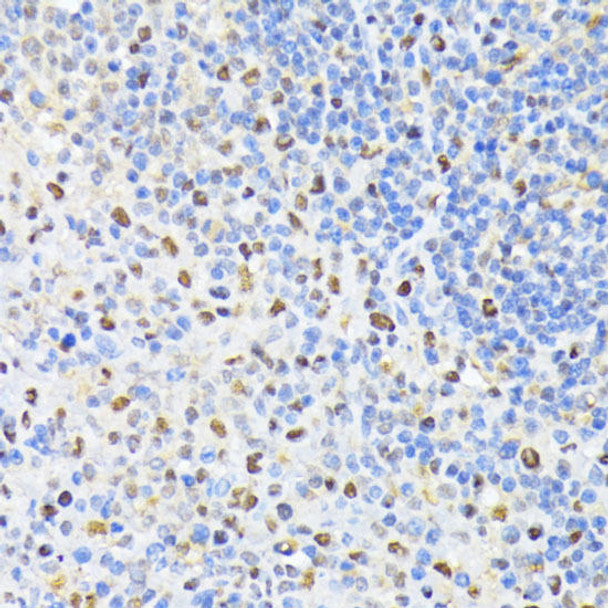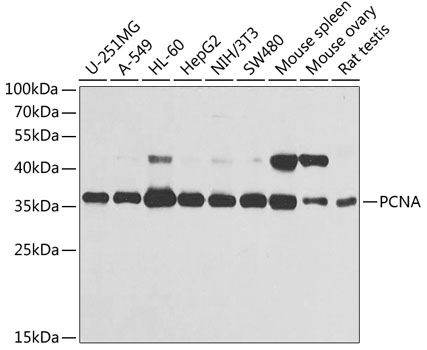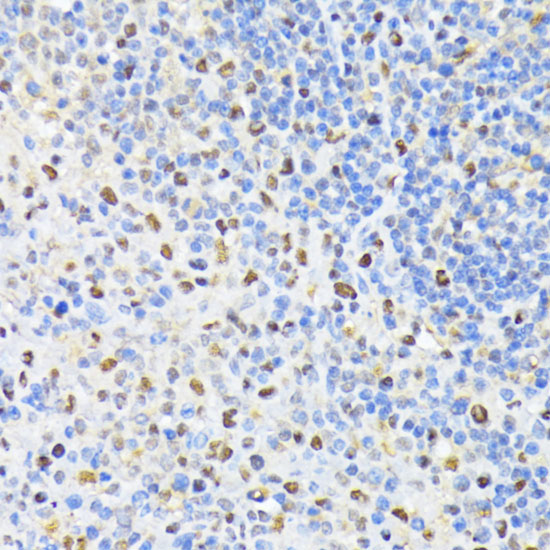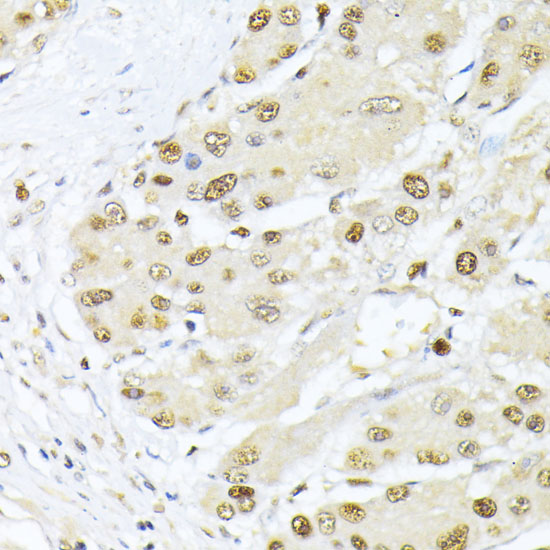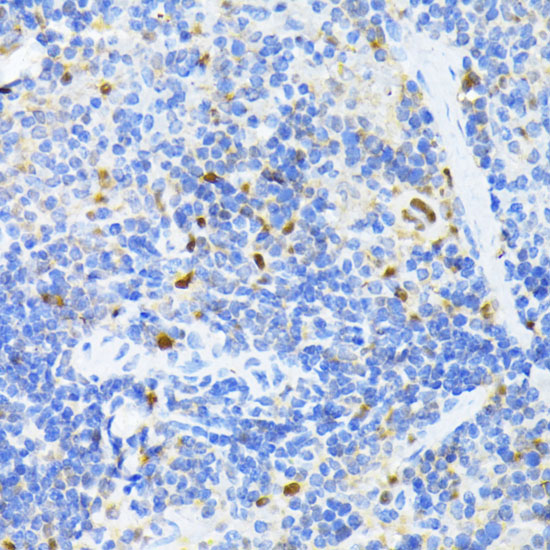Anti-PCNA Antibody (CAB13336)
- SKU:
- CAB13336
- Product type:
- Antibody
- Reactivity:
- Human
- Reactivity:
- Mouse
- Reactivity:
- Rat
- Host Species:
- Rabbit
- Isotype:
- IgG
- Antibody Type:
- Polyclonal Antibody
- Research Area:
- Epigenetics and Nuclear Signaling
Description
| 抗体名: | Anti-PCNA Antibody |
| 抗体コード: | CAB13336 |
| 抗体サイズ: | 20uL, 50uL, 100uL |
| 申し込み: | WB IHC |
| 反応性: | Human, Mouse, Rat |
| 宿主種: | Rabbit |
| 免疫原: | Recombinant fusion protein containing a sequence corresponding to amino acids 1-261 of human PCNA (NP_002583.1). |
| 申し込み: | WB IHC |
| 推奨希釈: | WB 1:500 - 1:2000IHC 1:50 - 1:100 |
| 反応性: | Human, Mouse, Rat |
| ポジティブサンプル: | U-251MG, A-549, HL-60, HepG2, NIH/3T3, SW480, Mouse spleen, Mouse ovary, Rat testis |
| 免疫原: | Recombinant fusion protein containing a sequence corresponding to amino acids 1-261 of human PCNA (NP_002583.1). |
| 精製方法: | Affinity purification |
| ストレージバッファ: | Store at -20'C. Avoid freeze / thaw cycles. Buffer: PBS with 0.02% sodium azide, 50% glycerol, pH7.3. |
| アイソタイプ: | IgG |
| 順序: | MFEA RLVQ GSIL KKVL EALK DLIN EACW DISS SGVN LQSM DSSH VSLV QLTL RSEG FDTY RCDR NLAM GVNL TSMS KILK CAGN EDII TLRA EDNA DTLA LVFE APNQ EKVS DYEM KLMD LDVE QLGI PEQE YSCV VKMP SGEF ARIC RDLS HIGD AVVI SCAK DGVK FSAS GELG NGNI KLSQ TSNV DKEE EAVT IEMN EPVQ LTFA LRYL NFFT KATP LSST VTLS MSAD VPLV VEYK IADM GHLK YYLA PKIE DEEG S |
| 遺伝子ID: | 5111 |
| Uniprot: | P12004 |
| セルラーロケーション: | Nucleus |
| 計算された分子量: | 28kDa |
| 観察された分子量: | 36kDa |
| 同義語: | PCNA, ATLD2 |
| バックグラウンド: | The protein encoded by this gene is found in the nucleus and is a cofactor of DNA polymerase delta. The encoded protein acts as a homotrimer and helps increase the processivity of leading strand synthesis during DNA replication. In response to DNA damage, this protein is ubiquitinated and is involved in the RAD6-dependent DNA repair pathway. Two transcript variants encoding the same protein have been found for this gene. Pseudogenes of this gene have been described on chromosome 4 and on the X chromosome. |
| UniProt Protein Function: | PCNA: This protein is an auxiliary protein of DNA polymerase delta and is involved in the control of eukaryotic DNA replication by increasing the polymerase's processibility during elongation of the leading strand. Induces a robust stimulatory effect on the 3'- 5' exonuclease and 3'-phosphodiesterase, but not apurinic- apyrimidinic (AP) endonuclease, APEX2 activities. Has to be loaded onto DNA in order to be able to stimulate APEX2. Homotrimer. Forms a complex with activator 1 heteropentamer in the presence of ATP. Interacts with EXO1, POLH, POLK, DNMT1, ERCC5, FEN1, CDC6 and POLDIP2. Interacts with APEX2; this interaction is triggered by reactive oxygen species and increased by misincorporation of uracil in nuclear DNA. Forms a ternary complex with DNTTIP2 and core histone. Interacts with KCTD10 and PPP1R15A. Interacts with POLD1, POLD3 and POLD4. Interacts with BAZ1B; the interaction is direct. Interacts with HLTF and SHPRH. Interacts with NUDT15. Interaction is disrupted in response to UV irradiation and acetylation. Interacts with p21Cip1/p21(CIP1) and CDT1; interacts via their PIP-box which also recruits the DCX(DTL) complex. Interacts with DDX11. Interacts with EGFR; positively regulates PCNA. Interacts with C12orf48/PARI. Interacts with SMARCAD1. Belongs to the PCNA family. |
| UniProt Protein Details: | Protein type:DNA replication; Cell cycle regulation Chromosomal Location of Human Ortholog: 20pter-p12 Cellular Component: nucleoplasm; centrosome; PCNA complex; nuclear replication fork; cytoplasm; DNA replication factor C complex; nucleus Molecular Function:identical protein binding; protein binding; DNA polymerase processivity factor activity; MutLalpha complex binding; purine-specific mismatch base pair DNA N-glycosylase activity; receptor tyrosine kinase binding; dinucleotide insertion or deletion binding Biological Process: mismatch repair; heart development; positive regulation of deoxyribonuclease activity; DNA strand elongation during DNA replication; response to lipid; DNA repair; leading strand elongation; G1/S-specific transcription in mitotic cell cycle; telomere maintenance via semi-conservative replication; cell proliferation; bypass DNA synthesis; response to cadmium ion; epithelial cell differentiation; base-excision repair; nucleotide-excision repair; transcription-coupled nucleotide-excision repair; telomere maintenance via recombination; nucleotide-excision repair, DNA gap filling; mitotic cell cycle; telomere maintenance; regulation of DNA replication; G1/S transition of mitotic cell cycle Disease: Ataxia-telangiectasia-like Disorder 2 |
| NCBI Summary: | The protein encoded by this gene is found in the nucleus and is a cofactor of DNA polymerase delta. The encoded protein acts as a homotrimer and helps increase the processivity of leading strand synthesis during DNA replication. In response to DNA damage, this protein is ubiquitinated and is involved in the RAD6-dependent DNA repair pathway. Two transcript variants encoding the same protein have been found for this gene. Pseudogenes of this gene have been described on chromosome 4 and on the X chromosome. [provided by RefSeq, Jul 2008] |
| UniProt Code: | P12004 |
| NCBI GenInfo Identifier: | 129694 |
| NCBI Gene ID: | 5111 |
| NCBI Accession: | P12004.1 |
| UniProt Secondary Accession: | P12004,B2R897, D3DW02, |
| UniProt Related Accession: | P12004 |
| Molecular Weight: | 261 |
| NCBI Full Name: | Proliferating cell nuclear antigen |
| NCBI Synonym Full Names: | proliferating cell nuclear antigen |
| NCBI Official Symbol: | PCNA |
| NCBI Official Synonym Symbols: | ATLD2 |
| NCBI Protein Information: | proliferating cell nuclear antigen; cyclin; DNA polymerase delta auxiliary protein |
| UniProt Protein Name: | Proliferating cell nuclear antigen |
| UniProt Synonym Protein Names: | Cyclin |
| Protein Family: | PCNA-associated factor |
| UniProt Gene Name: | PCNA |
| UniProt Entry Name: | PCNA_HUMAN |

